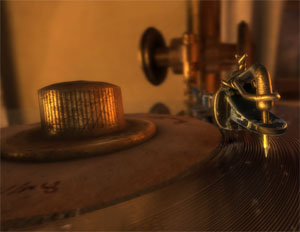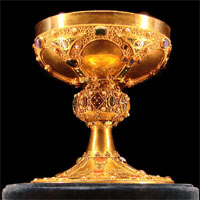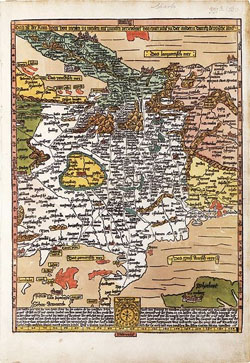This article was written in 2002 and originally published in Campaign Magazine.
 The worlds of a D&D campaign should be places of myth and mystery. There comes a point in, time, however, when a sense of complacency can begin to haunt your players: Orcs are no longer monstrous brutes, but a matter of routine; skeletons have become curious tactical problems without the faintest hint of horror about them; and even dragons may have acquired a certain taint of the mundane.
The worlds of a D&D campaign should be places of myth and mystery. There comes a point in, time, however, when a sense of complacency can begin to haunt your players: Orcs are no longer monstrous brutes, but a matter of routine; skeletons have become curious tactical problems without the faintest hint of horror about them; and even dragons may have acquired a certain taint of the mundane.
Sometimes what you need to reinvigorate a sense of wonder in your world can be found in the smallest of packages: A rune-inscribed parchment which describes the fall of an ancient city belonging to an empire which has been lost to the annals of history; fairy lights within the forest which escape description or explanation; a broken sword inscribed with the names of ancient heroes in the elder runes of elfish script.
For your consideration, then, we offer 101 curious items. Some of these might be used as the key to unlock deeper mysteries, explore unknown depths, or provide the seed of untold adventure. But, if nothing else, they will serve as a reminder to character and player alike that the worlds in which we game are places of pervasive magic, ancient history, and limitless wonder…
1. A miniature crystal – small enough to lie upon the outstretched finger of a halfling child – glows softly, and pulses whenever an object colored red is brought near.
2. An ancient, leather-bound volume written in an archaic script describes the composition and arrangement of the Outer Planes. Strangely, a rather substantial section of text – consisting of an entire chapter if you are translating the numbering correctly – has been torn out of the book. Despite this fact, you can detect no obvious gaps in the volume’s coverage of its subject matter. What unknown plane did that chapter describe?
3. A tattered, and sadly unusable, scroll fragment, inscribed with a spell unknown to any living mage.
4. A plain, and otherwise unremarkable, stone room contains one remarkable feature: Upon the floor shattered, multi-colored shards of glass have been carefully arranged into a perfect circle.
5. A weatherworn wooden board, inscribed with patterns which make it clear that it was once used for a game whose rules have long since been lost to time.
6. A clock which regularly keeps time… just not the time of this world. Although it is clear that the clock works to a clear pattern and purpose, attempts to decipher the method of its madness fail – as if it had been crafted upon rules of logic which no human mind can comprehend.
7. A blood-stained dress which, despite being found in ruins which have lain undisturbed for centuries, is still a vibrant, stunning blue.
8. An elegantly carved comb of oak, engraved with the name Aethelren and decorated with twin dragons. Elsewhere, a similar comb of ash, engraved with the name Ilthorien and decorated with twin unicorns, can be found.
9. What appears to be the original, handwritten manuscript of the Saga of the Warrior Prince Augustin – a classic ballad composed by the legendary bard Dathorn, famous for its lyrical quality and epic subject matter. A careful perusal of the text, however, reveals strange differences from the version of Augustin known to the bards of today…
10. A broken holy sword, inscribed with the name of a legendary Paladin.
11. A ruby the size of a man’s fist which sparkles and gleams with the promise of untold wealth in the faintest of lights, but which crumbles to dust upon the lightest touch.
12. A child’s poppet which is normal in all respects, except for the third eye to be found upon its forehead.
13. A long, black lock of woman’s hair, tied with a scarlet ribbon. When touched by human or elf, however, it changes color to match the holder’s own hair color. When touched by a dwarf, a scream of utter agony and anguish fills the air.
14. The holy symbol of a god long thought dead and gone. Although wrought in iron, it resists any normal attempts to damage it.
15. A map of a city which claims to be of a city the PCs know well, although the pattern of streets and names on the map are utterly different from the city of today.
16. A collection case holding fifty spent wands – crafted by the finest craftsman and enchanted by the mightiest wizards of a bygone age, but now reduced to mere wood, bone, and glass.
17. A small, granite pebble which registers faintly to detect magic and similar spells, but which is otherwise wholly unremarkable.
18. A cane of the purest white ivory, decorated with runes unknown to modern scholars, and topped with a handle of polished amber. Trapped within the amber is a strange creature unlike any the PCs have ever seen before.
19. A miniature, mechanical model of a city. When properly wound, its complex mechanisms set its tiny inhabitants into motion, simulating for them a rotating cycle of activities which last for seven days before seamlessly repeating.
20. A telescope of jade and banded with bloodstone. A character looking through the telescope sees not the world around them, but a strange, alien vista which – nonetheless – follows the motions of the telescope.
21. A large snow globe, with a sturdy base of polished oak, depicting a small farmhouse in the midst of a forest clearing. Shaking the globe causes the snow to gently fall, and as it does miniature figures exit the house and begin performing chores about the farmyard. The figures return to the house as the last flake falls.
22. A wood chip which acts as a magnet, despite its non-metallic nature.
23. A broken music box which still plays a hauntingly familiar, but unrecognizable, tune if it is wound beneath the rays of the full moon.
24. A complex set of interlocking gears which, if followed by the eye, seem to… twist at some point, as if they were not strictly bound by the geometry of this world. Although the device functions as a perpetual motion machine, it is not magical in any way.
25. A finely crafted compass of gold and silver, decorated and labelled with ornate, dwarven and draconic runes. Once every 1d4 hours it randomly changes the cardinal direction to which its arrow points.













